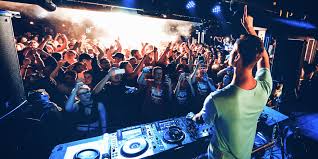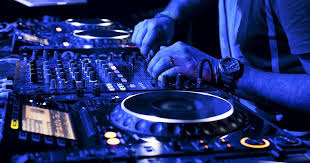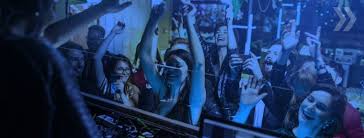What Does A DJ Actually Do? 4 Things You Need To Know
Most people would agree that being a DJ is an inherently cool job. You spend your nights in nightclubs playing music and controlling the dancefloor while you’re worshipped by your adoring fans.
But have you ever wondered what a DJ really does? It’s got to be about more than just putting on one song after another, right? What are all those knobs and buttons they keep touching? Or is being a DJ just about screaming profanities into a microphone all night?
For anyone who’s ever wondered about any of these things and more, here I reveal the secrets of the arcane craft of DJing as I answer the question, what does a DJ do?
BEATMATCHING ON STAGE
At its most basic, DJing involves transitioning from one record to another smoothly and seamless so the sounds of the two tracks don’t clash and disrupt the vibe on the dancefloor.
To do this, the first skill a DJ has to master is blending one song into the next, and this usually involves beatmatching.
Every track has a different tempo, which we measure in beats per minute (BPM), and to mix one song into another, the first thing you need to do is get them playing at the same speed.
BEATMATCHING DIGITALLY
Nowadays, with modern technology and digital music, you have a readout on your equipment telling you the speed of a track accurate to 0.01BPM, so you can do it visually instead of by ear. And on most equipment, you can also just hit the “sync” button, so you don’t even need to beat match yourself.
THE TRANSITION
When you’ve got your tracks playing at the same speed, you can then fade one track in and fade the other one out.
The simplest way of doing this is by playing the intro of the track you’re bringing in over the outro of the one that’s already playing.
This is because those parts of the song are the least busy and have fewer elements that can clash.
If you try to bring in a vocal from one track over the vocal from another, you’re just going to end up causing an inharmonious racket – especially if the songs aren’t even in the same key – and you’ll probably get booed out of the DJ booth.
Rather than doing this, the DJ needs to choose sections from the tracks that will sound natural when played at the same time. Then they can bring the new track in before taking the previous one out.
READING THE CROWD AND CHOOSING THE TRACKS
So far so good, but to this point, I’ve only been talking about the technical aspects of what the DJ does – but it doesn’t end there.
You can’t judge a DJ on their technical skills alone, and arguably what’s more important is the music they play. (In fact, not “arguably” at all since most people would agree that playing good music is far more important than having dazzling skills while playing awful tunes.)
A good DJ should be totally in tune with the crowd. They can feel the energy they are creating on the dancefloor and they know exactly which tune to put on next.
This means they know when to build it up but also when to take things down a notch. They know when to drop a banger, but they also know when to calm things down and give you a breather.
This is not about how well they can use the equipment, which buttons they press and which knobs they twiddle, but it is an extremely important part of what the DJ does. Not everybody can do it, and this is a big part of why people pay good money to see the best.

Tips for Becoming A Good DJ
If you wish to become a great DJ, you must know music; more importantly, you should be passionate about it. You must be able to understand the intricacies and technical aspects of rhythms. Additionally, you need to have a wide range of skills to make sure your clients are happy and satisfied.
- You should keep in mind that not everyone will love the record you are creating. This is why it is crucial for you to meet the clients to figure out what type of music they love.
- It is advised to have a library and backup music if the current list of songs is not suitable for the party.
- For being a successful DJ, you need to learn various kinds of music. It is recommended to become an all-rounder.
- You must know how to handle an MP3, CD, vinyl, and a laptop.
- You should have comprehensive knowledge about the Mixing desk and how to use it. You must know about gain PFL button, balance, crossfader, equalizer, and much more.
- It is advised to have complete knowledge about the nudging, sound effects, syncing and crossfading.
- For producing an excellent track, you need to have knowledge about grind effects, reverbs, vocoders, flangers, loop effects, delay effects, and bouncer effects.
- A great DJ must know how to use midi controllers.

Having Others On The Air
Whether the people with you are fellow DJs or guests, the most important thing to keep in mind is that the person running the audio board is the person in control. If someone walks into the studio and sits down during your air break and wants to talk, it is up to you to turn his or her microphone on. You also have the ability to turn it off.
A real conversation between two or three people can be interesting, but a lot of DJs will overdo it. Here are some guidelines for these kinds of situations:
- Think before you talk, and talk with a purpose. You don’t want your break to sound rehearsed, but you should always let your guest know what you will be talking about so you both can be prepared.
- Keep it brief. Just because more people are talking doesn’t mean you have more time to talk! In fact, you must be that much more conscious of the clock. It becomes easy to get distracted with the other person speaking. Don’t ramble.
- Limit the number of people in the conversation. Having more than three voices can be confusing for the listener. Two people should never share one microphone; it sounds horrible.
- Everyone in the conversation needs a microphone and needs to use it properly. While you may be able to hear someone standing in the studio doorway, your audience cannot. Therefore If someone is not on mic, they do not exist to the listener and shouldn’t exist in your conversation. If your guest is behind a microphone but is too far away from it, non-verbally cue him or her to get closer. Multiple times, if necessary.
- No inside jokes! They alienate anyone not in on the joke, in this case your entire audience.

Here’s What Djs Need To Know About Music Copyright
DJs around the world are becoming increasingly aware of copyright rules due to takedowns and mutings online – but the complex nature of music means that things aren’t always as clear as they could be.
Today, I hope to shed some light on this space that has been something of a gray area for many artists. We’ll discuss how things work, the copyrights that exist in a song, how licensing works in different countries, and why you need to know about all this as a DJ.
First: how copyright works
Let’s start with the two underlying pieces of intellectual property that are copyrighted in every song:
The underlying musical composition (also known as a musical work): This refers to the notes, lyrics and composition that form the core of the song. These could all be written by one person, or by multiple songwriters – as is the case for many pop songs.
The sound recording (also known as a ‘master’): This is created when you fix the musical composition in a tangible medium. Take, for example, when you go into the studio and record a track with a vocalist.
…and how to use it:
Anyone who wishes to use either of these copyrights from a song needs to license them from the person or entity that owns or controls the rights.
A Grant of Rights
Depending on how you would like to use them, you’ll need a different grant of rights in a license. Some examples of these grants include:
- A grant to publicly perform a sound recording
- A grant to record a cover version of a composition
- A grant to synchronize a composition to a video and make it available on-demand
Finding the right rights
This is only the first level of complexity. The next level arises because of the fragmented international nature of copyrights, and the fact that in each country or jurisdiction, you need to seek different rights from different entities.
To give some examples:
- In the United States, you need to clear the public performance right in musical composition through the ‘Performance Rights Organizations’ (ASCAP, BMI, SESAC, GMR). To make a copy of a composition (also called a ‘mechanicals right’) you can use a statutory license, but need to comply with certain regulations and rules written by congress. In the UK and most of Europe, these rights are usually bundled together and can be licensed through one entity such as the PRS in the UK.
- Sound recordings can either be licensed through a local collective management organisation like SoundExchange in the US. If the use case involves interactivity (meaning the ability for a listener to choose an individual song on-demand), you’ll need a direct license with record labels.
But not all platforms are behind this.
When streamers and DJs are hit by music copyright takedowns on other platforms like Facebook or Twitch, it’s because those platforms have not – for whatever reason – secured the right music licenses. They are not paying the artists that are getting played.
With that, keep in mind that it would be next to impossible for an individual DJ to clear the rights needed globally to stream a mix. This is not the fault of artists or labels. It’s down to the platforms.
Oftentimes, these platforms encourage DJs and artists to use their platforms despite not having the correct music licenses – all the while hiding in the small print of their terms and conditions that you “should not use copyrighted music.”
Many of these platforms are owned by some of the biggest businesses in the world, and yet are still dealing with copyright battles. For example, Twitch, which is owned by Amazon, has recently seen many DMCA takedowns for unlicensed copyrighted music.
These huge companies are very willing to use music to grow their businesses, but do they genuinely support music culture if they are not paying royalties to all artists?
How to Get a DJ Business License
Working as a DJ can be a solid career choice if you love parties, music, and performing. But like all career choices, becoming a DJ doesn’t just happen. You need more than an excellent sound system, headphones, microphone, and collection of tunes. You’ll have to deal with a learning curve, building publicity and for some venues, getting a DJ license. So how do you make your business boom and go from playing friends’ living rooms to qualifying for mega-events?
DJ Training Options
If you’re already working as a DJ, or even considering a career as a DJ, you’re likely already into both music and technology. Even so, it’s a bit of a jump from hobby to profession, and that can happen in a number of ways. While many DJs are self-taught, and simply practice at home and with friends, there are actual DJ training options out there.
These days, most DJ courses are conveniently available online. They can help you learn important skills like creating remixes, building a set list, and more. In addition, you can learn the basics of DJ software, how to expand your DJ business, and even how to improve your onstage appearance.
The truth is, it’s fairly unlikely that anyone will ever ask you about your DJ training credentials. Your proven track-record and skills are far more important when it comes to landing a job. Still, training courses can be helpful, building your confidence and improving your skills.
Do DJs Need a License to Play Music?
Once you decide to make your music passion a business, you’ll want to get booked for gigs. Most DJs start off at small venues like house parties and local bars. After that, you’ll likely move on, to anything from office parties to high school dances, private clubs, and wedding receptions. For these types of jobs, you don’t have to worry too much about a DJ music license. The venue generally will take care of things like ASCAP licensing, SESAC licensing, and BMI licensing which cover the necessary copyright and performance fees.
However, if you want to play at public events, then you’ll probably need to cover your own DJ license to play music. This public performance license, of course, is in addition to the general small business licensing you’ll need in order to operate including a local business permit and state registration. Also remember in terms of licensing, as a business, you need to legally purchase your music. That means no free downloads.
Get a License to Play Music in Public
The bottom line is that in order to play music in public, you need a public performance license. So if you book a gig, make sure to check with the venue. In most cases, as detailed above, they’ll have you covered. If, however, they’re not covering you, then you’ll need to deal with the performance license yourself.
How to get a DJ license is fairly simple – though a bit bureaucratic.
- You will need to be in touch with all three music licensing bodies (ASCAP, SESAC and BMI).
- You will then be expected to pay a portion of your revenues in royalties to the copyright-holders. This will be based on your playlist at each performance.
If you are a busy DJ, you may want your office manager or personal assistant to handle getting a DJ license for you. You could also consult with a qualified lawyer or accountant to make sure you’re handling this properly.